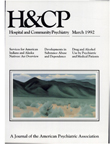An Overview of Mental Health Services for American Indians and Alaska Natives in the 1990s
Abstract
Native Americans appear to be at higher risk than other U.S. ethnic groups for mental health problems, including depression, substance abuse, domestic violence, and suicide. Despite recent increases in the federal budget for mental health services for Native Americans, less than 50 percent of the estimated need for ambulatory services is being met. Initiatives to improve the quantity and quality of mental health services for Native Americans in the 1990s include development of a national mental health plan, increased technical assistance to Native American communities, additional training and research, and continued attention to standards that promote high-quality, culturally relevant care. Tribes themselves are seen as the most appropriate locus for initiation of programs for preventing emotional problems in their communities.
Access content
To read the fulltext, please use one of the options below to sign in or purchase access.- Personal login
- Institutional Login
- Sign in via OpenAthens
- Register for access
-
Please login/register if you wish to pair your device and check access availability.
Not a subscriber?
PsychiatryOnline subscription options offer access to the DSM-5 library, books, journals, CME, and patient resources. This all-in-one virtual library provides psychiatrists and mental health professionals with key resources for diagnosis, treatment, research, and professional development.
Need more help? PsychiatryOnline Customer Service may be reached by emailing [email protected] or by calling 800-368-5777 (in the U.S.) or 703-907-7322 (outside the U.S.).



